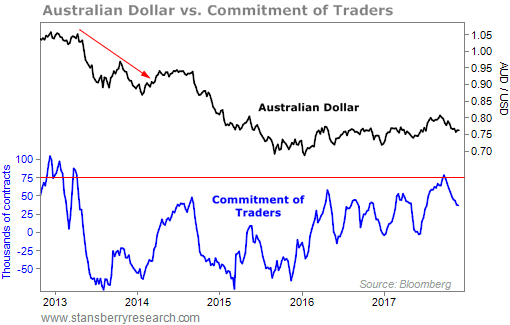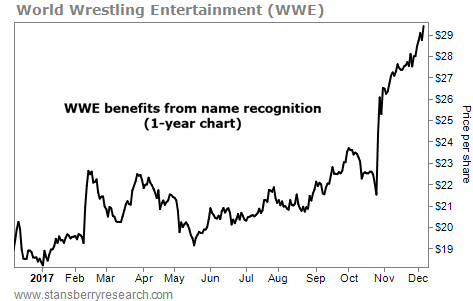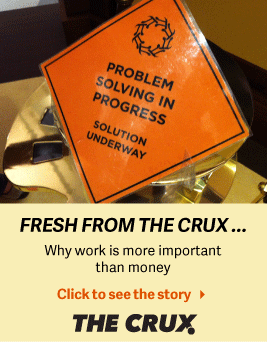| Home | About Us | Resources | Archive | Free Reports | Market Window |
99% of Investors Don't Do This... Here's How to Be the 1%By
Thursday, December 7, 2017
The setup was perfect for one particular trade last month – so we pulled the trigger in my True Wealth newsletter.
So far, we're up 6%. And our potential upside is 30%. But that's not what's important today...
What's important is knowing what to look for in a trade.
Today, I'll start by explaining what I look for in a trade setup. Then, I'll use our True Wealth trade as an example, so you can see for yourself how it works.
Let me explain...
First off, you want to put the odds in your favor from the start.
This is not hard to do, but many people skip this step entirely...
Ideally, I want my potential gain to be at least three times my downside risk. For example, if I believe my upside potential on a trade is 30%, then I often set a hard stop loss at 10%.
That means if a stock is at $50, and you believe it has 30% upside (to $65), then you would plan to sell if it falls to $45 – no questions asked.
What? You think that's too tight? You're afraid you are going to get stopped out?
Then maybe your big idea isn't good enough.
I hate to break it to you. But that might be the case. If you want to use a wider stop, then you'd better find a stock with more upside potential.
Why do I do this? The main reason, as I said, is that it puts the odds in my favor... If I lose 10% on two trades but make 30% on one trade, then I still come out ahead.
Beyond putting the odds in my favor, the second thing I look for is this: Ideally, I want to buy what's 1) hated, and 2) trending "up."
In short, you want to buy when no one else is interested so the trade has room to move higher. But this isn't enough by itself... You need to know that the stock won't just keep falling. That's why I wait for the start of an uptrend. I wait for the market to confirm my idea... Then, I get in.
Now, let me show you what we did in our True Wealth trade...
Last month, I recommended buying the ProShares UltraShort Australian Dollar Fund (CROC).
This fund works as a leveraged bet AGAINST the Australian dollar. So in this case, we turned our second idea around... The Aussie dollar was overly loved, and the trend was down. That's what we wanted to see.
The easiest way to tell when an asset is overly loved or hated is to look at the Commitment of Traders (COT) report. It shows the real-money bets of futures traders.
As you can see below, based on the COT report, the Australian dollar recently hit its most loved level in more than four years. The last time we saw the Aussie dollar at these levels, it fell dramatically over the next six months. Take a look...
 We also put the odds hugely in our favor on this trade... I told subscribers to take all profits once they're up 30%. But we entered the trade with seven or eight times the potential reward relative to our risk (around 4%). We saw the Aussie dollar was overly loved... We saw the trend start to move in our favor... And we saw that we could set up a trade with good odds. So we bought.
The trade setup is still good today. Your downside risk is still about 4%.
But the point today isn't about making a bet against the Aussie dollar. Instead, I wanted you to see how I think about a trade...
Set your odds. Set your stop. Then, wait for trend to move in your favor before you act.
I would bet that 99% of investors don't do these basic things. I urge you to be part of the 1% that does...
Good investing,
Steve
Further Reading:
In this classic series, Steve digs deeper into what he looks for in a trade. "Within two minutes, I knew everything I needed to know," he writes... Check out his step-by-step rundown here and here.
"The reward-to-risk ratio should be the first thing that pops into your mind when you think about successful trades," Ben Morris says. Learn how to plan great trades with a better understanding of risk right here: How to Do Even Better Than 'Dazzling' Gains.
Market NotesTHIS ENTERTAINMENT COMPANY RIDES A NEAR-MONOPOLY Today, we visit a popular entertainment company dominating its niche...
Companies with iconic brands can charge premium prices because they enjoy tremendous customer loyalty. Consumers trust well-known brands to deliver quality goods. This even holds true in the entertainment industry... Popular media franchises are known for their die-hard fans. Not only that, but they're able to sell licensed products under their brands that folks can't buy anywhere else.
Sports-media company World Wrestling Entertainment (WWE) is the world's largest professional-wrestling promoter. It holds hundreds of events each year. The WWE Network has around 1.5 million subscribers worldwide... but the company also earns money from video games, collectibles, merchandise, live events, and licensing. The broad reach of this brand has paid off... In its last quarterly earnings report in October, revenue grew 14% year over year to $186 million.
As you can see in the chart below, the stock has skyrocketed after its earnings announcement. Shares are up more than 52% over the past year, and have reached new 52-week highs. It's more proof that iconic brands can bring in excellent returns for investors...
 |
Recent Articles
|



